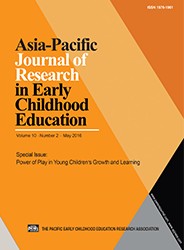Early Mathematical Learning: Number Processing Skills and Executive Function at 5 and 8 Years of Age
Early Mathematical Learning: Number Processing Skills and Executive Function at 5 and 8 Years of Age
- The Pacific Early Childhood Education Research Association(환태평양유아교육연구학회)
- Asia-Pacific journal of research in early childhood education
- Vol.9 No.3
-
2015.0945 - 66 (22 pages)
-
DOI : 10.17206/apjrece.2015.9.3.45
- 2

This research investigated differences and associations in performance in number processing and executive function for children attending primary school in a large Australian metropolitan city. In a cross-sectional study, performance of 25 children in the first full-time year of school, (Prep; mean age = 5.5 years) and 21 children in Year 3 (mean age = 8.5 years) completed three number processing tasks and three executive function tasks. Year 3 children consistently outperformed the Prep year children on measures of accuracy and reaction time, on the tasks of number comparison, calculation, shifting, and inhibition but not on number line estimation. The components of executive function (shifting, inhibition, and working memory) showed different patterns of correlation to performance on number processing tasks across the early years of school. Findings could be used to enhance teachers’ understanding about the role of the cognitive processes employed by children in numeracy learning, and so inform teachers’ classroom practices.
Introduction
Method
Results
Discussion
References
(0)
(0)